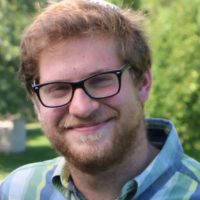
נער הייתי | Reflections from Berlin and Jerusalem
Jared Skoff | National Ramah and Ramah Wisconsin
Originally from Cleveland, Ohio, Jared Skoff is the Program Director of the National Ramah Commission. In this role, he organizes curriculum development and logistics for Ramah’s national training conferences and year-round fellowship programs. He has worked on the staffs of the Ramah Davidson Metro Detroit Fellowship, Camp Ramah in Canada, and Camp Ramah in Wisconsin, most recently as Rosh Tikvah. Jared is a graduate of Washington University in St. Louis, and is the youngest dues-paying member of The Workmen’s Circle.
“נער הייתי גם זקנתי ולא ראיתי צדיק נעזב וזרעו מבקש לחם”
“Once, I was young; then, I grew older. But I never saw a righteous man forsaken, nor his children begging for bread.”
As we recited birkat hamazon after our Shabbat dinner at the Oranienberger Strasse Masorti Synagogue in Berlin, I was struck by this sentence in our bentsher, often accompanied by playful hand motions at Ramah camps. The birkat hamazon booklet, redacted by the community’s rabbi Gesa Ederberg, instructed the diners to recite the line at a whisper’s volume, which we did.
Though I had never before seen this custom in writing, I knew that my grandparents (Rabbi Benson and Rosalind Skoff, z”l) also shied away from this line; in fact, they never recited it at all. Instead, as was the custom of their household, we all hummed along with the tune before rejoining for the final lines of the prayer.
My grandparents, both the first in their families to be born outside of Europe, who knew what happened to those who stayed behind, who watched their family and neighbors struggle to make ends meet in this country, could not stomach singing about a fantasy where good people never suffer.
Here, I thought, steps away from streets where brass markers commemorate the names of Jews evicted from their homes, where broken glass undoubtedly adorned the pavement three-quarters of a century earlier on Kristallnacht, the dishonesty of these words is even more glaring.
Beyond liturgy, there are components of our broader Jewish identity and history that we struggle with. What aspects of our Jewish tradition do we proclaim with pride? What aspects do we confine to a whisper? And what aspects of our identity do we omit, or barricade?
We spent nearly two weeks in close proximity to barricades, walls with varying purposes and connotations. We visited Ha-Kotel Hakatan, a small, secluded portion of Jerusalem’s Western Wall. We watched armed military personnel turn away dark-skinned men from the walls of the Lions Gate. We watched from afar as Palestinians passed through the checkpoint to Israeli soil. We drove through the walls separating Bethlehem from Kever Rachel, the monument to the matriarch Rachel’s grave. We saw the graffiti-decorated remnants of the Berlin Wall preserved in outdoor parks, galleries, and memorials. We walked through the high walls and gates of the Saschenhausen concentration camp.
Equally profound were moments where we witnessed barricades slowly breaking down. We stepped over a miles-long row of cobblestone on the streets of Berlin, understatedly marking where the Wall once stood. We heard a young Palestinian tour guide and an orthodox Rabbi “settler” share their stories at Roots (Judur/Shorashim), a family field dedicated as the “Palestinian Center for Nonviolence” in Gush Etzion junction.
We also davened with two rabbinical schools in Berlin: the Abraham Geiger College and the Zacharias Frankel College. The Abraham Geiger College, named after the founding father of Reform Judaism, is accredited by the Reform movement and was founded in 1999 as the first rabbinical school in Germany since the Holocaust. The Zacharias Frankel College, which ordains Masorti (Conservative) rabbis under the auspices of the Ziegler School of Rabbinic Studies, is named after a major progenitor of Conservative Judaism.
From our history, we know that these two men, Abraham Geiger and Zacharias Frankel, didn’t get along. Absent a famous gun duel, their rivalry nears Hamilton/Burr proportions. Geiger’s writings inspired the founding of the Jewish Theological Seminary of Breslau, making him a shoo-in for its first chancellor. In a controversial decision, Frankel was appointed instead – eventually setting the ground for a Conservative institution of the same name in New York City. In perhaps their most well-known dispute, Frankel stormed out of the Reform Rabbinical Conferences, in part based on his opposition to replacing Hebrew with the vernacular in prayer services.
And here we sat in Berlin, with the intellectual descendants of these two brilliant Jewish scholars coming together to daven as they do each week, singing along with our Ramah melodies, dedicated with single purpose to building a vibrant and unique German-Jewish community in the 21st century.
As we continue to grapple with the barricades and walls that remain, this experience struck me as a powerful source of hope and pride. My grandparents could never have imagined that Jews of all ages would be breathing new Jewish life into existence on German soil.
Judaism has an alternate approach to the cognitive dissonance of birkat hamazon. Though the words of the prayer are distastefully untrue, we can hold onto the world it describes as an aspirational reality. We can sing the words, and we can devote ourselves to making them true. In the way that they approach this sentence, with a whisper, the Masorti Jews who we met in Germany continue to acknowledge their communal past, but they refuse to give up hope for Germany’s vibrant, just, and Jewish future.
To read more about the Kerem cohort’s trip to Israel and Germany, check out Simon’s post and Ari’s post.
